Add this eBook to your basket to receive access to all 243 records. Our indexes include entries for the spelling cumberland. In the period you have requested, we have the following 243 records (displaying 161 to 170): These sample scans are from the original record. You will get scans of the full pages or articles where the surname you searched for has been found. Your web browser may prevent the sample windows from opening; in this case please change your browser settings to allow pop-up windows from this site. Victoria Intestates
(1862)
The probate courts of the Australian colonies furnished returns of estates of deceased intestates, giving full name, colonial residence, supposed British or foreign residence of family (often unknown, or left blank), amount of the estate and how much had been disbursed and how. The date of death is often stated, and if by accident, suicide or crime. Names were carried forward from return to return until the estate was expended or exhausted. | Sample scan, click to enlarge

| Boys entering Cheltenham College
(1863)
Cheltenham College 'was founded in order to provide for the sons of gentlemen a Classical, Mathematical, and General Education of the highest order, on moderate terms, in strict conformity with the principles and doctrines of the Church of England.'
Andrew Alexander Hunter, the college registrar, compiled the first edition of the College Register in four parts from 1883 to 1886: these merely listed the boys by term of entry, with their dates of birth and names and addresses of their fathers. Circulars were also sent out to all Old Cheltonians whose addresses were known, requesting additional details. On the basis of the returns from these and Hunter's further researches, this much fuller register was published in 1890.
The information after each boy's name is given (where known and applicable) in this format: father's full name and address as of the time the boy entered the college; class and department on entering the college (classes being number from 1 downwards, and these again divided into A and B, some into C and D, others into P (Principal's side) and V. P. (Vice-Principal's side) - 1A was the highest class in each department: besides this, certain others were called Addiscombe, Woolwich, Civil, Direct, Line, Sandhurst, Naval, Special, Preparatory, Latin, and India Civil) and the same on leaving, name of Boarding House (or 'Day Boy'), scholastic and athletic honours attained at the college, and subsequent career (including date and place of death, or present address in 1890, if known). | Sample scan, click to enlarge
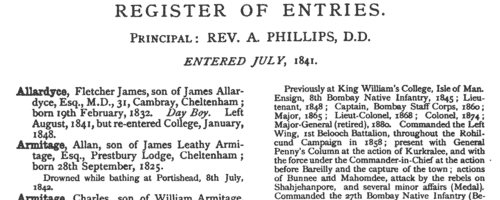
| Unclaimed Money and Property
(1864)
Gun & Co. of 17 Charlotte Street, London, published this 'List of Next of Kin & Heirs, &c., who have been Advertised for in the English, Irish, Scotch, United States of America, Canadian, Australian, East and West Indian, and other Newspapers, since 1704. Money & Property to the value of many Millions Sterling want Claimants'. The list of 4076 names gives surname, christian name, and, occasionally, locality. Copies of the actual advertisements were furnished to enquirers by the company at a cost of six shillings. | Sample scan, click to enlarge
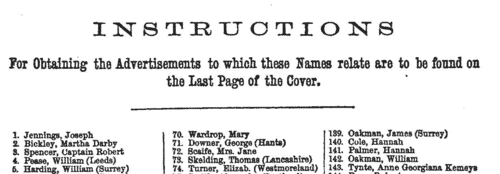
| Wesleyan Ministers
(1867)
The Wesleyan Methodist church in England and Ireland held annual conferences, abbreviated minutes of which were printed in the Wesleyan Methodist Magazine of September and October each year. These minutes include a complete list of the stations of the ministers for the coming year, with the names of the preachers 'on trial' and supernumeraries, arranged by district. The 32 British districts are covered, but not the ministers in Ireland or abroad. | Sample scan, click to enlarge
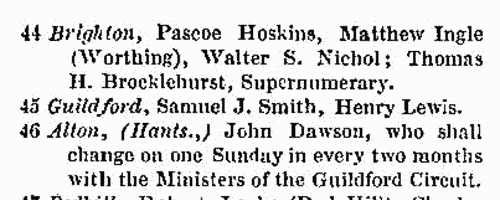
| Electors for Lillington
(1868)
A poll for the election of two knights of the shire to represent South Warwickshire was held 24 November 1868: the candidates were Lord Hyde (H.), Sir R. N. C. Hamilton (H.), H. C. Wise, Esq. (W.) and John Hardy, Esq. (H.). This poll book lists all those electors who voted; the county franchise included not only male freeholders of 40s a year, but also £10 copyholders and long-leaseholders, and £50 short-leaseholders and tenants. In addition, where no vote was cast the elector's number and name are given, the name in italics. The names are arranged by polling district and then by parish or township. Freeholders holding requisite property in a district are listed there, but might well reside elsewhere. The right-hand column indicates how each man voted. | Sample scan, click to enlarge
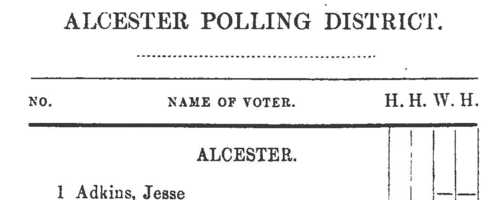
| Electors for Sherbourn
(1868)
A poll for the election of two knights of the shire to represent South Warwickshire was held 24 November 1868: the candidates were Lord Hyde (H.), Sir R. N. C. Hamilton (H.), H. C. Wise, Esq. (W.) and John Hardy, Esq. (H.). This poll book lists all those electors who voted; the county franchise included not only male freeholders of 40s a year, but also £10 copyholders and long-leaseholders, and £50 short-leaseholders and tenants. In addition, where no vote was cast the elector's number and name are given, the name in italics. The names are arranged by polling district and then by parish or township. Freeholders holding requisite property in a district are listed there, but might well reside elsewhere. The right-hand column indicates how each man voted. | Sample scan, click to enlarge
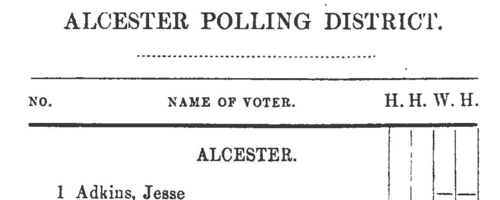
| London University Matriculation List
(1870)
The matriculation list of the University of London published in January 1870 shows all the students entering the university 1865 to 1869, but who had not yet taken an examination. The alphabetical list gives full name, surname first; year of matriculation; and the name of the school or college (or private study or the name of a tutor) of previous education. | Sample scan, click to enlarge

| Baptists
(1873)
The Baptist was a weekly newspaper, with some general news and political coverage, but mainly devoted to chronicling Denominational Intelligence, i. e. the doings of the Baptist churches in Britain and Ireland. January to June 1873. | Sample scan, click to enlarge
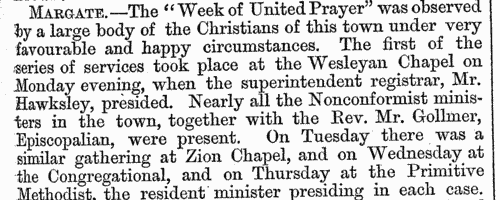
| Petroleum Licences: Poplar
(1875)
Under the provisions of the Petroleum Act of 1871, the London Metropolitan Board of Works was given the power to grant annual licences to the owners of premises which had been inspected and certified as fit for the storage of petroleum. The lists state parish or district; name (surname first); case number; address (including house number); quantity to be kept, in gallons, and the nature of the storage facility. July to December 1875. | Sample scan, click to enlarge

| Baptists
(1876)
The Baptist was a weekly newspaper, with some general news and political coverage, but mainly devoted to chronicling Denominational Intelligence, i. e. the doings of the Baptist churches in Britain and Ireland. July to December 1876. | Sample scan, click to enlarge
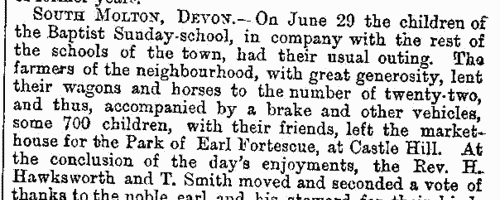
|
Research your ancestry, family history, genealogy and one-name study by direct access to original records and archives indexed by surname.
|











